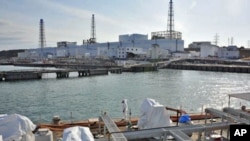A plan to inject nitrogen into the containment vessel around reactor 1 at the Fukushima Daiichi power plant appears to be working, the plant owner said Thursday. Higher pressure levels have been measured inside the vessel, indicating the nitrogen is going in as intended.
Tokyo Electric Power said the possibility of an explosion is low, but the work is necessary because of the risk that rising levels of hydrogen inside the containment vessel could cause a blast that would release deadly radiation.
Hydrogen explosions already have blown the roofs off reactor buildings one and three.
An explosion inside the containment vessel, the protective concrete shell that surrounds the reactor pressure vessel, would be serious and likely would release more radioactive debris into the air and environment.
Tokyo Electric also plans to pump nitrogen into reactors two and three, but started with reactor one because it appears to have the most damage.
Meanwhile, levels of radioactive iodine-131 in seawater around the plant have dropped sharply, after a crack that was leaking highly toxic water was plugged Wednesday.
Measurements showed levels 140,000 times the legal limit - still very high - but much lower than the 7.5-million times the limit measured in the past week.
The levels of radiation in towns and villages around the plant continue to be of concern to residents, and Chief Cabinet Secretary Yukio Edano said government advice for them may be reviewed.
Edano said the government will consider the effects of long-term exposure to radiation on residents in the 20- to 30-kilometer zone around the Fukushima plant. At present, residents are advised to stay indoors as much as possible, but in some cases it might ask residents to evacuate.




